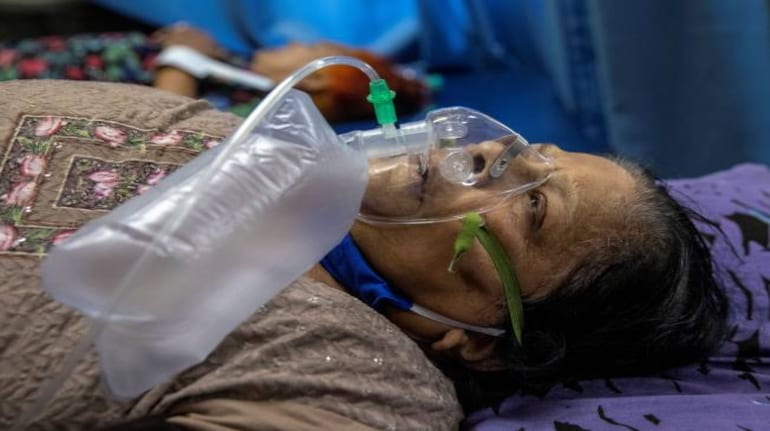



It was 29-year-old Anjum Khan’s decision to take her mother-in-law Fareha Khan (56) to a hospital in south Delhi that turned out to be bad for both of them.
On the morning of April 16, Anjum noticed that her mother-in-law had developed a cough. Despite giving her some cough syrup, Fareha continued to complain of body ache. Anjum called up her family physician and booked an appointment for the next day. He prescribed some medicines.
Her husband, Mubhashir Khan, had gone to work and the local chemist told her that they would take an hour to deliver the medicines. Despite being eight months pregnant, she walked to the chemist’s shop and bought medicines.
As Anjum stepped out, the Delhi government, around 12 noon on April 16, announced that the city would be under curfew for the weekend, and fearing that her mother-in-law would miss her appointment, she, after consulting her husband, decided to take her mother-in-law to a local hospital.
That’s how she visited Alshifa Multispeciality Hospital, near New Friends Colony in New Delhi.
No beds, hospitals at full capacity
Two days later, both Anjum and Fareha were struggling with high fever, body ache, vomiting, and loss of appetite.
When they tried to get admitted to Alshifa Hospital and Holy Family Hospital, they were told that both hospitals were operating at full capacity, and no beds were available.
After struggling for hours to get a bed and supplies, Anjum and Fareha were admitted to the intensive care units at a hospital in Malviya Nagar, after doctors found their Tweets and contacted them.
When Moneycontrol spoke to Mubhashir, outside the gates of Holy Family Hospital on April 19, he just couldn’t hold back his tears, after his wife, his unborn child and mother were denied admission to two hospitals and both were struggling to breathe.
Not just a one-off case
Moneycontrol visited four local hospitals-- Holy Family, Sujan Mohinder Hospital, Alshifa Multispeciality Hospital and Indraprastha Apollo Hospital--in and around New Friends Colony in Okhla, New Delhi. The stories were the same -- lack of beds, lack of oxygen, grief, despair, and helplessness.
Larger hospitals like Indraprastha and Holy Family were waiting for shipments of oxygen and Remdesivir to arrive for the day, after their earlier stock was exhausted.
Doctors at smaller hospitals like Sujan Mohinder Hospital and Alshifa Multispeciality were requesting relatives of patients to arrange for oxygen and Remdesivir as the hospitals had run out of stocks.
The hospitals have put their pandemic plan into action, adding more beds and creating makeshift COVID-19 wards. But in certain areas, there are simply not enough doctors, nurses, and specialists to staff those beds.
Some healthcare workers said that COVID-19 patients require twice as much attention as typical intensive care unit patients.
“Last Monday, we had 25 patients waiting in the emergency department. They had been admitted but there was no one to take care of them,” said Annie George, a nurse in Holy Family Hospital.
Doctors attend to patients outside hospital buildings
The road leading up to Indraprastha Apollo Hospital on Mathura Road, on March 19, was also filled with patients and their families, waiting in line.
Volunteers, doctors and security personnel were all attending to patients waiting outside the hospital, ensuring that critical patients are not left unattended.
Thirty-nine-year-old Suresh Pant and his wife Amrita were two such patients waiting outside Indraprastha Apollo Hospital on March 19. While Amrita had not yet developed breathlessness, she had a high fever and Suresh was in a wheelchair where doctors were tending to him.
While a bed was not available for Suresh, doctors had created an impromptu stand to hold his oxygen canister to help him cope with his breathlessness.
While they both tried to make arrangements for bed in other hospitals, Amrita, having struggled with fever all morning, ignored her dizziness. That is until she fainted outside the hospital and just like her husband was given a wheelchair and an impromptu stand to hold her oxygen stand and drip to help her recover.
Non-COVID patients also being denied entry to hospitals
Patients with other medical problems are also being denied entry, several doctors said.
“On Friday, a family had come. One of their sons had fallen and broken his ankle. All we could do was pop the ankle back in place and recommend to a specialist, as the X-ray wards were full of COVID-19 patients who were waiting to get their chest X-rays,” Dr Avinash Bansal at Indraprastha Apollo said.
Hospitals have canceled elective surgeries and pulled in doctors from outpatient clinics. People with heart problems, cancers, strokes, and other diseases are also finding it harder to get medical help, and some fear contracting COVID-19 from the hospital.
'Go to a hospital only if it’s very urgent'
These stories of helplessness, inadequate medical supplies and grief are increasing by the day.
Even as the Delhi government has declared a complete lockdown and the Centre has made everyone above 18 years of age-eligible for vaccination, doctors have a word of advice.
“I would like to request everyone who has developed COVID-like symptoms of fever, cough, cold, blocked nose, etc., to either consult a doctor online or call up doctors unless they need critical care,” Dr Mujahid Ahmed at the Alshifa Hospital told Moneycontrol.
“Avoid going to a hospital on your own or with someone, unless you require critical care. Even if you do not have COVID, there are chances that you can catch the disease from patients at the hospital,” Dr Ahmed cautioned.
Discover the latest Business News, Sensex, and Nifty updates. Obtain Personal Finance insights, tax queries, and expert opinions on Moneycontrol or download the Moneycontrol App to stay updated!
Find the best of Al News in one place, specially curated for you every weekend.
Stay on top of the latest tech trends and biggest startup news.